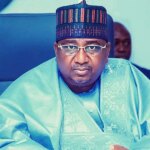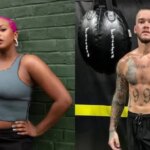
There’s palpable tension in Delta State as the Gbaramatu-Ijaws on Monday, sent a warning to the Itsekiris not to trespass and claim ownership of Ijaghala Community and other lands belonging to them (Gbaramatu-Ijaw) to avoid crisis.
They said they will not fold their hands and watch anyone come, invade and claim Ijaghala Community and their lands because they are peaceful and law-abiding.
Spokesman of Gbaramatu Kingdom, High Chief Godspower Gbenekama, handed down the warning to the Itsekiri people at a press conference held at Ijaghala Community town hall today.
Gbenekama insisted that the Itsekiris are customary tenants to the Gbaramatu people, just as he maintained that they should not for any reason(s) trespass and claim ownership of Ijaghala Community to avoid any form of crisis.
This is coming as the Itsekiris, a few days ago, in a “Save Our Soul” message sent to President Bola Ahmed Tinubu, Delta State Governor, Sheriff Oborevwori, and the relevant security agencies, said there’s tension in the riverine communities—especially Ijaghala, Kantu, Obodo, Omadino, Ugborodo, and other Itsekiri communities—following an alleged threat issued to their people by former leader of the Movement for the Emancipation of the Niger Delta (MEND), High Chief (Dr.) Oweizide Government Ekpemupolo, alias Tompolo, and the Ijaws of Gbaramatu Kingdom. The Itsekiris have been claiming ownership of Ijaghala Community, a riverine settlement.
However, the leadership of Ijaghala Community, at the press conference, said they are part of Gbaramatu Kingdom and not Ugborodo Community, as claimed by the Itsekiri people, just as they pledged their allegiance to the Pere of Gbaramatu Kingdom, HRM Aketekpe Agadagba II, Oboro Gbaraun.
According to the leaders, “The general public, local government, federal government, and the international community should take note that Ijaghala (Zou-Ala Uba) Community in Gbaramatu Kingdom is an Ijaw community and is never, was never, and will never be part of the Itsekiri ethnic nationality.”
The Ijaghala Community leaders, which include the Tieyemienwei of Gbaramatu Kingdom, Chief Samuel Oritsegbubemi Eyengho; Mr. Sunday Akpa Fundlire Akpfundlire; Mr. Wilson Abeson; Youth President Remere; (Mrs.) Grace Remere Lukundritse Mofe; Mrs. Dolor Utseoritselaju; Mr. Ebi Jolomi; and Mrs. Mary D. Sangbajumi, spoke on behalf of their people.
They said, “This press conference is in tandem with our earlier publication made by Ijaghala elders about the history of Ijaghala people published (Sunday Vanguard Page 20, November 2, 2008).”
“Ijaghala used to be a fishing and palm wine tapping camp of Gbaramatu forebears before Egbegha was born and prior to the existence of Ugborodo. It has been called Zou-Ala Uba because of the distance from the entrance to other adjoining creeks and creeklets.
“Oweizibiri, the father of Egbegha, had earlier settled with other Ijaw indigenes in Amadino (Omadino) before he left his kinsmen to settle in Ikantu. After several years, Egbegha relocated from Ikantu to Oporoza, from where he moved to Zou-Ala Uba and lived permanently. Despite the fact that so many great men of Gbaramatu Kingdom had lived in Zou-Ala Uba and engaged in their natural occupations of fishing, hunting, and palm wine tapping, Egbegha’s permanent stay in Zou-Ala Uba made him known as the founder of the community. He died as an old man and was buried in Oporoza, the traditional headquarters of Gbaramatu Kingdom.
“After Egbegha had settled at his newfound community, he took a wife from Ugborodo by the name Erigbawewenimara, and the marriage produced two children, namely Egogo and Asako.
“While growing up, these children were more close to their Ugborodo mother, who spoke the Itsekiri dialect with them. In turn, Egogo also married Itsekiri women and brought them to Ijaghala (Zou-Ala Uba). Egogo, through his marriage, gave birth to a number of children who also spoke the Itsekiri dialect. This is how the Itsekiri dialect became spoken by some of the Ijaghala people, and thus the community became affiliated with the Itsekiri ethnic group.”
The Ijaghala Community leaders expressed dismay that some of the descendants of Egbegha and Egogo still engage in alienating their paternal ancestral Gbaramatu land to their maternal Ugborodo Community.
“We strongly condemn the attitudes of these persons, which have been causing problems among our kith and kin in Oporoza Community, Gbaramatu Kingdom, and the larger Ijaw nation.
“From the foregoing, we want to categorically state and inform the general public, local, state, and federal governments, and the international community that Ijaghala (Zou-Ala Uba) Community has an ancestral lineage with Gbaramatu Kingdom in Warri South West Local Government Area, Delta State, and will continue to affirm and remain in the traditional institution of Gbaramatu Kingdom.
“Finally, we hereby pledge our loyalty and allegiance to His Royal Majesty, Oboro Gbaram II (JP), Aketekpe Agadagba, the Pere of ancient Gbaramatu Kingdom.”
Ijaghala belongs to Gbaramatu, not Itsekiri – Gbenekama declares


